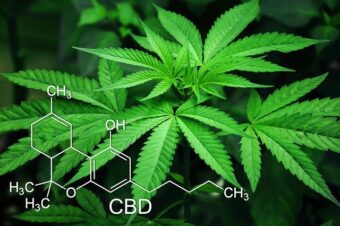What makes Delta 8 THC so different from other cannabinoids? Why is it such a hot topic in the cannabis research community? There has been a lot of buzz about the newly discovered Delta 8 THC, and for a good reason. This new compound, also known as Tetrahydrocannabivarin, has great medicinal potential.
This article will discuss the science behind Delta 8 THC, its potential medical applications, and the future of cannabis research.

Introduction To Delta 8 THC
Delta 8 THC is a nonpsychoactive cannabis compound that binds to CB2 receptors in the immune system and central nervous system. It’s used for pain, inflammation, sleep, and mood disorders.
Certain cancers may also respond positively to delta 9 THC. Learn about the latest research and options for treating pain and inflammation with cannabis.
Defining Delta 9-THC
Delta 9 THC is a plant yielding an edible form of delta 9-THC. This non-psychotomillogenic cannabis compound has been found to have a wide variety of potential therapeutic applications, alongside many physical and behavioral highs. It is thought to work by blocking neuromodulators associated with the central nervous system. These neuromodulators are thought to play a role in mood disorders and anxiety, alongside pain, nausea, vomiting, and modulation of the central nervous system.
The Cannabidiol -9 STEP
Scientists isolated delta 9 THC in 1996 from cannabis plants sprayed with glyphosate. Over 99.9% of ‘sprayed’ plants contained the plant metabolite, delta 9-THC. The remaining individual plants had a lower amount of delta 9-THC. Plants sired by males were 5–10 times more potent at blocking receptors than females.
The higher the concentration of delta 9-THC in the female plants, the higher the compound concentration in their offspring males. It resulted in a higher proportion of males with elevated Delta 9-THC receptor density.
It is significant because many female-only-bred marijuana plants tend to possess lower Delta 9 receptor densities; males generally have higher Delta 9-THC receptor densities. This research only showed a correlation between the higher concentration of delta 9-THC in male plants and the higher quantities of Delta 9-THC produced by females.

THC Studies
Delta 9 THC is gaining popularity for its potential medicinal applications, despite many other well-established compounds having shown comparable potency and demonstrated efficacy for pain relief.
What Makes Delta 8 THC So Unique?
Delta 8 THC is a marijuana compound that doesn’t give you that mind-altering high like THC, but it has many of the same painkilling and anti-inflammatory properties as THC. It’s made when marijuana is exposed to a high-pressure CO2 extraction.
Furthermore, because Delta 8 is synthetically produced, CBD can be added to it to treat certain medical conditions. The delta-9 claim Most of the attention around Delta 9 THC has been centered on tetrahydrocannabinol, or THC.
Delta 9 THC has surpassed Delta 8 in recent years, partly because, when smoked, it delivers a higher pain-relief rate. According to new research, even with the benefits of THC, there may be an advantage to using Delta 9 THC instead of THC for specific medical conditions.
For example, headaches from glaucoma may be relieved with Delta 9 THC, as the endocannabinoids in weed bind to the voltage-gated calcium receptors in the brain that the receptors help to signal.
Delta 9 can also be taken as a supplement to boost the body’s antioxidant defense systems. Dummy testing Although Delta 9 THC has been studied extensively and proven effective in treating ailments like cancer, Alzheimer’s, and epilepsy, and it is not yet approved by the FDA or used to treat anything.
It makes it difficult to evaluate the effectiveness of Delta 9 compared to THC, which is legally available in many forms and marketed to treat suffering. CBD the other main focus of research around Delta 9 THC is CBD or cannabidiol.
CBD is a nonpsychoactive, natural component of marijuana that is a safe and effective treatment for conditions like PTSD and cancer. CBD’s similarity to CBD led researchers to label it a compound of concern. CBD is isolated from the hemp plant and is synthesized.
Because it’s not a psychoactive component, it’s considered safer than other high-inducing chemicals like THC. CBD is touted as a safe treatment for disorders like anxiety, nausea, seizures and pain, and a promising alternative to prescription medications.
Shop the best CBD products now.
How Is Delta 8 THC Commonly Consumed?
Delta 8 THC is commonly ingested by smoking or vaping. Delta 8 THC is also used by other edible, tincture, and topical products.

What is Delta 8?
The delta-9 tetrahydrocannabinol or Delta 9 THC has been isolated and named after Dr. Yaniv Marao, a former professor and professor emeritus from the University of Southern Denmark, where it was first discovered.
This substance has a less steady vapor than the THC you smoke, penetrating more deeply into the lungs and less concentrated. Very rarely will you see THC measured in death as it would typically be in their bloodstream.
Still, it’s present in a minimal amount. One gram is 50 times smaller than the amount of CBD, the primary component of cannabis that medical professionals recommend since it’s nonpsychoactive, which you’ll find in many products.
However, likely, you won’t consume more than six milligrams of Delta 9 THC a day. Due to its high heat and combustion potential (it’s a high-heat, low-gasolization, aromatic plant), it would be unsafe to smoke or eat this substance in any way. It is because it’s not a legal drug in most states.
Instead, it’s often added to foods, as it is in certain products such as chocolate and cookies. Here’s what else to keep in mind: The term “THC” is used here to describe all of the Delta 9 tetrahydrocannabinols, and not just delta 9 THC because one of the other non-activated components is nicotinyl compound.
Inhalation of Delta 9 THC
With the name delta-9, you likely think this is similar to tetrahydrocannabinol mentioned above. It is indeed a close resemblance, but that’s because delta-9 THC binds to the same receptors in the body as tetrahydrocannabinol. It is important to note because the two are fundamentally different, and you can definitively test this at your local dispensary.
What Are The Potential Medical uses Of Delta 8 THC
Delta 8 THC is a nonpsychoactive compound found in marijuana that may benefit patients with Alzheimer’s disease, chronic pain, and cancer patients undergoing chemotherapy.
Due to its nonpsychoactive properties, Delta 8 THC effectively treats pain and inflammation without causing the psychotropic effects typically associated with marijuana use.
There is currently a lack of FDA-approved Delta 8 THC products, so it remains to be seen as a viable treatment option for long-term relief. Some anecdotal evidence suggests that it may be beneficial for pain, especially the acute kind, but there is still a lack of long-term studies evaluating its effectiveness. Read on to find out the answers to these questions and more.

Marijuana For Musculoskeletal Pain Relief And Joint/Stress Relief
Delta 8 seems to be particularly effective in treating musculoskeletal pain. It simply causes less base muscle pain and stiffness than other cannabis compounds. Many patients have been prescribed non-steroidal anti-inflammatory drugs (NSAIDs), such as ibuprofen, because of pain in the R joints. NSAIDs usually have a sedative effect that can reduce a person’s ability to move and exacerbate stress, making the pain worse.
Delta 8, however, has a much less sedative effect and seems to have neuroprotective properties, which could help protect neurons. While other NSAIDs may cause gastrointestinal side effects, Delta 8 has little effect on the GI tract and can serve as an appetite suppressant (which reduces food intake).
Studies have shown that Delta 8 has a more significant impact on soft tissue than NSAIDs in treating musculoskeletal pain. While NSAIDs can decrease muscle strength. Muscles that cannot recover entirely due to inflammation will typically rely on therapeutic factors’ healing effects, including physical therapy, ice, massage, acupuncture, Epsom salt baths, anti-inflammatory drugs, and even spinal decompression and electrical stimulation. Combining this with other anti-inflammatory compounds found in cannabis would provide the most effective treatment.

Basal Hypothesis
The basis for the scientific study hypothesizes that a reduction in the racket, or the perception of noise, may provide pain relief. Learn More
CBD MALL offers natural, effective pain management.
We understand the challenges you face. CBD products are legal in all 50 states.
CBD Mall is the World’s Largest CBD Store with over 100 products that range from CBD hemp oil to CBD pet treats.
CBD Mall is your one-stop shop for anything and everything related to cannabidiol (CBD).
We carry a vast selection of the best and strongest Cannabidiol products on the market, including oils, edibles, and much more!
Whether you’re looking for a high-powered concentrate or an all-natural balm, we’ve got you covered.
Discover a new 100% natural legal buzz. Get yours now!
Cheers,
Kevin



